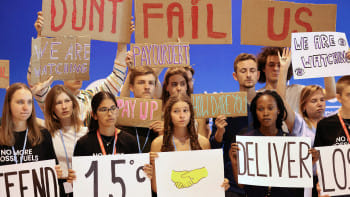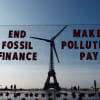What exactly is the outcome of COP27?

The recently concluded 27th Conference of Parties (COP27) on climate change finally agreed to set up a loss and damage fund to pay reparations to developing nations ravaged by extreme weather events caused by climate change. Although the agreement is laudable, details as to how much money should be paid, who should pay, and how the money should be spent by the most vulnerable countries will be decided at COP28, to be held next year in Dubai.
Having said that, there is no guarantee that the rich nations, who are also the biggest greenhouse gas (GHG) emitters, will deposit money into the fund. Lest we forget, the United States, European Union and other rich nations pledged, years ago, to mobilise USD 100 billion every year in climate finance by 2020 to help poorer countries, the collateral victims of climate change, adapt to the devastating effects of global warming. They are now falling short by tens of billions of dollars annually.
Even though the US agreed to the fund, Congress must appropriate the money. Last year, the Biden administration sought USD 2.5 billion in climate finance but secured just USD 1 billion, and that was when Democrats controlled both chambers. With Republicans set to take over the House in January, the prospects of Congress approving a new pot of money for loss and damage appears dim.
While appreciating the consensus on loss and damage, many environmental groups, climate activists and nations are unhappy with the compromises made on phasing out fossil fuels and curbing climate change. Moreover, because the host country produced a text that clearly protected the fossil fuel industries, there is criticism that the outcome of COP27 was influenced by the presence of hundreds of their representatives. It is, therefore, hard to see how the agreement is more than symbolism.
Suffice it to say, whatever has been accomplished at COP27 is a feel-good measure that will in no way reduce carbon dioxide emissions – which are now at or close to 420 parts per million – nor will it keep the global temperature rise to 1.5 degrees Celsius. According to the Global Carbon Project, global emission of carbon dioxide in 2022 is projected to be 36.6 billion tonnes. Furthermore, a recent UN analysis revealed that emissions in 2030 would be 16 percent higher than in 2010. This is in stark contrast to the 50 percent cut that scientists at the Intergovernmental Panel on Climate Change (IPCC) say is needed to hold global warming to 1.5 degrees. Or else, temperature may rise by about 2.7 degrees by the end of this century.

China, US, India and Russia combined emit nearly 55 percent of the annual carbon dioxide emission, while well-nigh a billion out of eight billion people in the world don't burn fossil fuels at all. Ironically, China and India are considered developing countries affected by climate change, and are thus eligible for compensation from the loss and damage fund. Bangladesh, on the other hand, emits a mere 0.21 percent, yet a third of the country will be under water sooner than later due to sea-level rise.
For years, scientists have been trying to hammer into the heads of world leaders, albeit in vain, that the benefits of stopping fossil fuel use far exceed the costs – in dollars and lives – that we will incur by failing to curb human-induced climate change. It is still possible to slow down the progression of climate change, but the political will to do so is beyond daunting.
So, has COP27 succeeded or failed? It's not difficult to answer the question. Given that no decisions were made to address the severity of climate impacts, world leaders and their sidekicks came to Egypt to admit defeat. That makes COP27 memorable in its failure to meet any desirable objective.
In fact, all the climate conferences failed to make any difference in the level of threat we are facing. We don't see any downshift in the consequences of climate change. That's because actions taken so far by our leaders tantamount to treating the effects of an infection while the disease rages on. In the meantime, as the GHG concentration continues to increase unabated, we are inching closer to the tipping points that will push us all towards extinction.
Climate change is an existential threat that demands immediate action. If we truly care about each other and all other living beings, we have to declare a climate emergency and confront it with the seriousness and resolve that it demands. Otherwise, the very difficult situation we are in today will only get exponentially more dire with every fraction of a degree of warming, whereas every inkling of warming averted will save innumerable lives.
Dr Quamrul Haider is a professor of physics at Fordham University in New York, US.

 For all latest news, follow The Daily Star's Google News channel.
For all latest news, follow The Daily Star's Google News channel. 










Comments